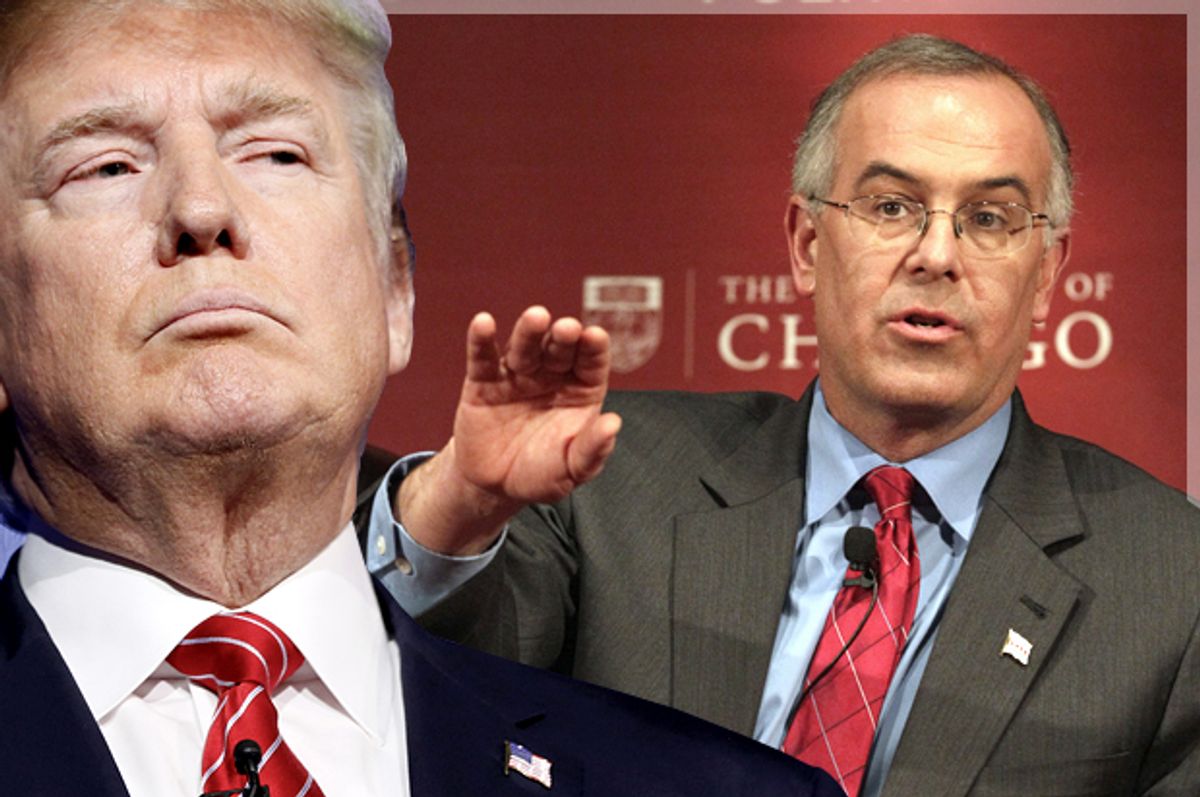You know, as lousy as he is at punditry — and he is terrible, make no mistake — when it comes to being a diagnostician, David Brooks may be even worse.
Over the past five or so years, he’s become increasingly critical of the angry white populism that’s come to dominate his onetime home, the Republican Party. He’s called its proponents “amateurish” and “mediocre.” He’s referred to its champions as embodiments of “pagan brutalism” and the modern equivalent of the Pharisees.
Yet at no point during this forced march toward “apocalyptic” nihilism did Brooks seem willing to do more than offer a cursory description of the GOP’s illness. At no point did he seem willing to move past the symptoms and focus on the disease. Perhaps that’s just more proof of his intellectual limitations. My suspicion, however, is that it’s a guilty conscience — not a lack of intelligence — that’s primarily to blame.
For a case in point, look no further than his most recent column, an all-out assault on the essence of Trump 2016. “Trump represents the path the founders rejected,” Brooks warns his New York Times readers, among whom the median annual income (for digital-only subscribers) is likely north of 70 grand. “Trump is the culmination of the trends we have been seeing for the last 30 years,” he continues, before offering up a list.
Trump, Brooks tells us, is the end result of:
[T]he desire for outsiders; the bashing style of rhetoric that makes conversation impossible; the decline of coherent political parties; the declining importance of policy; the tendency to fight cultural battles and identity wars through political means.
More terrible still, Brooks writes, is the “political narcissism” that’s embedded within Trump’s version of right-wing demagoguery. The unwillingness to “recognize other people” — and “accept the legitimacy of other interests and opinions” — that creates a yearning for “total victories,” and militates “against politics” itself. You see it “best exemplified” by the Tea Party, he argues. It’s not politics but “antipolitics.”
And antipolitics is not just distasteful or wrongheaded, Brooks goes on to tell us. The “tendency” toward antipolitics “has had a wretched effect on our democracy.” It’s led to “incompetent” legislators and “dysfunctional government.” It’s empowered those who “make soaring promises and raise ridiculous expectations.” It’s created Donald Trump.
Once again, Brooks is happy to describe the problem. And once again, he has precious little to say about its source. It’s all well and good to call out Republicans for their fecklessness and their cynicism. But at this juncture, figuring out why millions of Americans are “looking for a superhero,” as Brooks snidely puts it, is what we should be doing. It’s our only chance to figure out how to make them stop.
I’ve written about some of the likely causes already. But there’s at least one likely contributing factor that I haven’t previously touched on, in part because it’s not really in my wheelhouse. It has to do with how Trump’s Republican supporters feel they’ve been treated by the party apparatus; by its bureaucrats and donors, and by its leading media figures — such as best-selling author and center-right columnist David Brooks.
It’s impossible to deny, after all, that part of the reason Republican voters have flocked to Trump is in order to send the party establishment a signal. (And that that signal is basically a middle finger, upturned.) Elevating Trump — which goes against the urgings of nearly every party leader, apparatchik and pundit — is a form of mass insolence. It’s the kind of behavior that’s usually accompanied with declarations, like “enough is enough!”
If Republican voters’ perception of themselves as disdained and mistreated strikes you as odd, read this Brooks column from late 2014 (headline: Snap Out of It), which doubles as an encomium to the government-by-elitist bureaucracy that he’s long held dear. In the piece, Brooks asserts that America is suffering from a “leadership crisis.” The good news, though, is that it’s “eminently solvable.”
Here, according to Brooks, is what needs doing (emphasis mine):
First, we need to get over the childish notion that we don’t need a responsible leadership class, that power can be wielded directly by the people. America was governed best when it was governed by a porous, self-conscious and responsible elite — during the American revolution, for example, or during and after World War II. Karl Marx and Ted Cruz may believe that power can be wielded directly by the masses, but this has almost never happened historically.
Talk about "antipolitics"!
Given the multitude of legitimate reasons voters have to feel restive, angry and insecure, is it any wonder that Brooks’ message — Stop wasting time with your “childish” pretentions of “direct” self-government; do what you’re told! — has been greeted with such fury? It doesn’t excuse Trump’s thuggishness or his backers’ authoritarian inclinations. But it helps explain why so many of them are willing to “burn it all down.”
So, fine, congratulations to David Brooks for recognizing Trump as problematic. But before he mounts his high horse and heads to the more civilized enclaves of the D.C. suburbs and Manhattan, Brooks should think long and hard about why the Republican Party — and the country — is now flirting with such toxic politics. His supposed expertise on humility notwithstanding, I think spending some time in front of a mirror would help.

Shares